(完整版)小学常见介词用法辨析及习题
小学英语介词总结附练习(K12教育文档)

小学英语介词总结附练习(word版可编辑修改)编辑整理:尊敬的读者朋友们:这里是精品文档编辑中心,本文档内容是由我和我的同事精心编辑整理后发布的,发布之前我们对文中内容进行仔细校对,但是难免会有疏漏的地方,但是任然希望(小学英语介词总结附练习(word 版可编辑修改))的内容能够给您的工作和学习带来便利。
同时也真诚的希望收到您的建议和反馈,这将是我们进步的源泉,前进的动力。
本文可编辑可修改,如果觉得对您有帮助请收藏以便随时查阅,最后祝您生活愉快业绩进步,以下为小学英语介词总结附练习(word版可编辑修改)的全部内容。
小学英语介词总结介词(Preposition)一、概述介词是英语中很活跃的词,一般置于名词之前。
它常和名词或名词性词语构成介词短语。
同一个介词常和不同的词语搭配形成固定搭配,表示不同意义。
二、常用介词的基本用法at①表示时间: I go to school at seven every day 我每天早上7点去上学。
②表示在某一具体地点: He is standing at the bus stop 他站在公共汽车站。
③表示动作的方向、目标: Let me have a look at the picture 让我看看这幅图。
④用于某些固定搭配: at once 立刻、马上 at last 最后at the same time 同时 at first 开始时not at all 一点也不about①表示大约时间: I's about six o'clock now. 现在大约6点钟了。
②表示地点;在……周围: Everthing about me is so beautiful 我周围的一切都那么美好。
③关于,对于: We are talking about the news。
我们正在谈论新闻。
after①在……之后: After dinner I watch TV. 晚饭后我看电视.②在……后面: He came into the room after me. 他在我后面进了房间。
(完整版)小学常见介词用法辨析及习题

(完整版)⼩学常见介词⽤法辨析及习题⼩学常见介词⽤法辨析⼀、介词的定义及分类介词是⼀种⽤来表⽰词与词、词与句之间的关系的虚词,,在句中不能单独作句⼦成分。
介词后⾯⼀般有名词、代词或相当于名词的其他词类,短语或从句作它的宾语。
按构成分为简单介词(in、on、at等)、合成介词(into、within等)、重叠介词(at about等)、短语介词(in front of等)。
⼆、⼩学常⽤介词⽤法释义(⼀)表时间1、常⽤词in、on、at。
In:①+年份/世纪。
in 2019(在2019年);In the1990s(在19世纪90年代).①+⽉份。
In May(在五⽉).①+季节。
In spring/summer/autumn/winter(在春/夏/秋/冬季).①+⼀天的某个时间段(上午、下午、晚上等)。
In the morning/afternoon/eveningat :①+时刻、⼏点。
at six(在6点)/~half past ten(在10点半)①+年龄。
at thirteen/~the age of thirteen(在13岁时)①+某个时段at noon(在中午),at night(在晚上), at midnight(在午夜),at dawn(在黎明)on :①+星期⼏。
on Wednesday/Sunday(在星期三/在星期⽇)①+⽇期。
On June 4th =on the fourth of June (在六⽉4⽇)①+有day的节⽇。
On Christmas Day/Teacher’s Day(在圣诞节/教师节)①+具体某⼀天。
On a cold day(在⼀个寒冷的⼀天)、on Sunday afternoon(在星期⽇下午)2、其他常⽤词Before:在...之前after:在...之后since:⾃从...开始for +⼀段时间until:直到...时候from...to:从...到...(⼆)表⽅位1、常⽤词in、on、at。
小学英语介词用法及习题三篇.doc

小学英语介词用法及习题三篇第1条初级英语中的一些介词用法1、介词at、in和on在小学英语at中的用法表示一个时间点;意味着一段时间;意味着一个特殊的日子。
他早上7点去上学。
你能在两天内完成这项工作吗?琳达出生于5月2日。
1 .通常接下来是几分钟、早晨、中午、日出、日落、开始等。
例如,在五点钟(5点钟),在黎明(黎明),在黎明(黎明),在日出(日出),在中午(中午),在日落(日落),在晚上(午夜),在初月初,在时间(那时),在时刻(那时),在时间(一天的这个时候)。
2.in通常接年份、月份、日期、上午、下午、晚上、白天、季节、世纪等。
例如,在XXXX,在5月,在XXXX,在早晨,在下午,在傍晚,在傍晚,在周日,在21世纪(21,在周/月,在周,在周,在周,在周)。
3.on之后通常是一天、一周中的一天、一周中的一天或一个周日的早上和晚上、节日和下午,修饰语、晚上,等等。
如星期日、四月初一(四月的一个温暖的早晨)、十二月的晚上(十二月的一个晚上)、下午、下一个晚上(第二天晚上)、圣诞节下午(圣诞节下午)、1949年10月1日(1949年10月1日)、新年日(新年)、新年夜(除夕)、十一月十五日(十五日上午)等。
初级英语语法中介词for的用法概述1.表示“as 、as”。
我早餐喜欢面包和牛奶。
我们晚餐吃什么2.表示原因或理由,意思是“因为、因为”。
谢谢你帮我学英语。
谢谢你的最后一封信。
谢谢你这么努力地教我们。
3.表示动作的对象或接收者,意思是“to”、“for”。
让我帮你捡起来。
看电视太多对你的健康有害。
4.表示时间、距离,意思是“米、距离”。
我通常早上跑步一小时。
我们将在那里呆两天。
5.表示目的地、目的地,意思是“方向、方向、接受、购买”等。
我们去散步吧。
我来拿我的书包。
我在XXXX度过的年数、季节、月,一般(未指明)早、中、晚等。
如果你想在三十年前,一周前使用,但是你必须禁止具体的日期,你必须在早上和下午使用,而在下午,你必须在一天和下午使用才能清楚地记住午夜和黄昏。
小学英语介词用法大汇总(附练习及答案)

小学英语介词用法大汇总(附练习及答案)1.On:The book is placed on the desk.What do you do on Wednesdays?XXX 2nd.2.In:XXX inside the pencil-box.His birthday is in October。
He worked here in 1992.XXX.What are your plans for the next 20 years?I do XXX.3.At:I usually go to school at 8:00 am.XXX:1.Under: There is a ball under the bed.2.Near: There is a book shop near our school.3.In front of: A boy is standing in front of the house.4.XXX: A XXX.5.Next to: There is a bus n next to No.13 Middle School.6.Over: A bridge is over the river.7.On the left: The bookstore is on the left.8.On the right: The hospital is on the right.There XXX een Class One and Class Three。
9.Sharks can dive into the deep。
cold water。
10.(1) XXX2) What does he look like。
11.(1) It's approximately 6:00 now。
2) What about。
How about。
专项练一、填空1.The first day of school2.On the school playground3.Attending classes4.Every Wednesday5.Visiting a farm6.Pulling carrots7.A lot of fruit trees8.Living in a town9.On the weekends10.In the sitting room11.On the 4th of November12.Look at them13.Chinese New Year14.Christmas Day15.Dress up in costumes二、选择题1.On the afternoon of May。
四年级英语介词用法练习题50题答案解析版
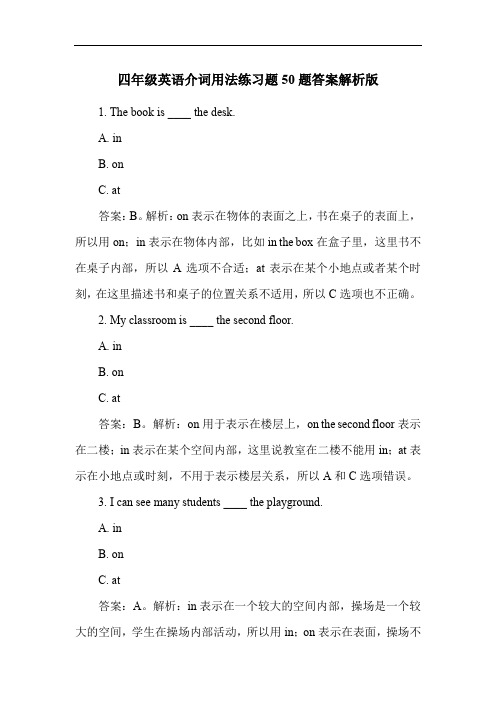
四年级英语介词用法练习题50题答案解析版1. The book is ____ the desk.A. inB. onC. at答案:B。
解析:on表示在物体的表面之上,书在桌子的表面上,所以用on;in表示在物体内部,比如in the box在盒子里,这里书不在桌子内部,所以A选项不合适;at表示在某个小地点或者某个时刻,在这里描述书和桌子的位置关系不适用,所以C选项也不正确。
2. My classroom is ____ the second floor.A. inB. onC. at答案:B。
解析:on用于表示在楼层上,on the second floor表示在二楼;in表示在某个空间内部,这里说教室在二楼不能用in;at表示在小地点或时刻,不用于表示楼层关系,所以A和C选项错误。
3. I can see many students ____ the playground.A. inB. onC. at答案:A。
解析:in表示在一个较大的空间内部,操场是一个较大的空间,学生在操场内部活动,所以用in;on表示在表面,操场不是一个平面概念,所以B选项不合适;at表示小地点或时刻,不符合这里的语境,C选项错误。
4. The library is ____ the school.A. inB. onC. at答案:A。
解析:in表示在学校这个范围内部,图书馆在学校里面,所以用in;on表示在表面,图书馆不是在学校表面,B选项错误;at表示小地点或时刻,不能用来描述图书馆和学校的这种包含关系,C选项错误。
5. The teacher stands ____ the blackboard.A. in front ofB. in the front ofC. at the front of答案:A。
解析:in front of表示在物体外部的前面,老师站在黑板的前面,是在黑板这个物体外部的前面,所以用in front of;in the front of和at the front of都表示在物体内部的前面,老师不是在黑板内部的前面,所以B和C选项错误。
四年级英语介词用法练习题50题含答案解析
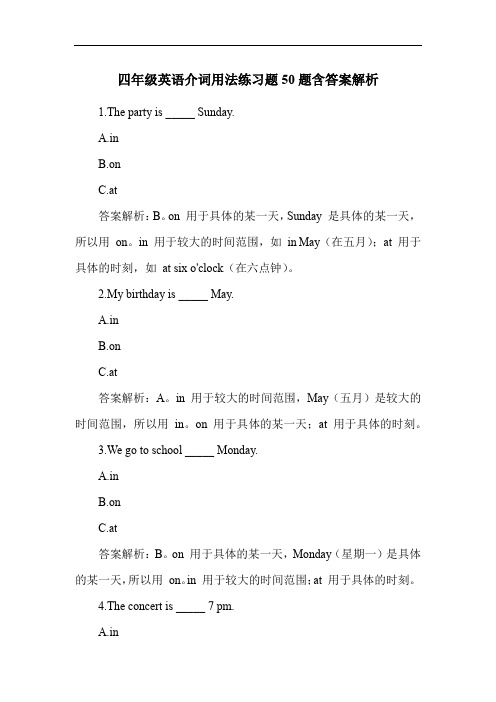
四年级英语介词用法练习题50题含答案解析1.The party is _____ Sunday.A.inB.onC.at答案解析:B。
on 用于具体的某一天,Sunday 是具体的某一天,所以用on。
in 用于较大的时间范围,如in May(在五月);at 用于具体的时刻,如at six o'clock 在六点钟)。
2.My birthday is _____ May.A.inB.onC.at答案解析:A。
in 用于较大的时间范围,May(五月)是较大的时间范围,所以用in。
on 用于具体的某一天;at 用于具体的时刻。
3.We go to school _____ Monday.A.inB.onC.at答案解析:B。
on 用于具体的某一天,Monday( 星期一)是具体的某一天,所以用on。
in 用于较大的时间范围;at 用于具体的时刻。
4.The concert is _____ 7 pm.A.inB.onC.at答案解析:C。
at 用于具体的时刻,7 pm(晚上七点钟)是具体的时刻,所以用at。
in 用于较大的时间范围;on 用于具体的某一天。
5.She was born _____ 2010.A.inB.onC.at答案解析:A。
in 用于较大的时间范围,2010 是较大的时间范围,所以用in。
on 用于具体的某一天;at 用于具体的时刻。
6.The meeting is _____ March 15th.A.inB.onC.at答案解析:B。
on 用于具体的某一天,March 15th( 三月十五日)是具体的某一天,所以用on。
in 用于较大的时间范围;at 用于具体的时刻。
7.We have a picnic _____ summer.A.inB.onC.at答案解析:A。
in 用于较大的时间范围,summer( 夏天)是较大的时间范围,所以用in。
on 用于具体的某一天;at 用于具体的时刻。
小学英语介词的用法及专项练习

小学英语介词的用法及专项练习介词的定义和作用介词是英语中一类重要的词性,用于连接名词、代词、动词或者其他介词与其他成分之间的关系。
介词可以表达方向、位置、原因、时间等等。
常见的英语介词有:in, on, at, for, with, by, from, to, over, under 等。
介词的用法1. 表示地点表示地点- in: 在某个区域或范围内- The cat is in the box.(猫在盒子里。
)- on: 在某个平面或表面上- The book is on the table.(书在桌子上。
)- at: 在某个具体的位置- She is waiting at the bus stop.(她在公交车站等待。
)2. 表示时间表示时间- at: 表示具体的时间点- The meeting starts at 9 o'clock.(会议在9点开始。
)- on: 表示某一天或日期- I have an appointment on Monday.(我在星期一有个约会。
)- in: 表示一段时间内- They will go on vacation in July.(他们将在七月份去度假。
)3. 表示原因表示原因- for: 表示目的或理由- We go to the park for a picnic.(我们去公园野餐。
)4. 表示方式表示方式- with: 表示伴随或使用- She writes with a pen.(她用钢笔写字。
)5. 表示运动表示运动- from...to: 表示由某个地方到另一个地方- He walked from home to the school.(他从家里走到学校。
)介词练请根据句子的意思,选择适当的介词填空。
1. The dog is __ the yard.(狗在院子里。
)2. My birthday is __ Sunday.(我的生日在星期天。
小学、初中英语介词总结,练习和答案
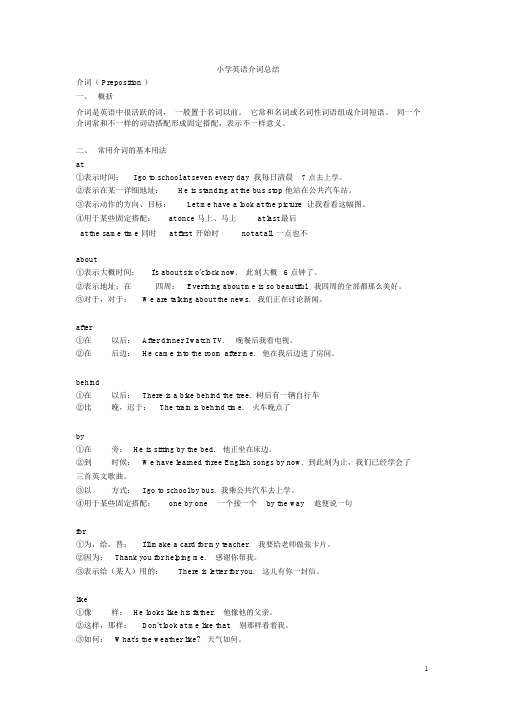
小学英语介词总结介词( Preposition )一、概括介词是英语中很活跃的词,一般置于名词以前。
它常和名词或名词性词语组成介词短语。
同一个介词常和不一样的词语搭配形成固定搭配,表示不一样意义。
二、常用介词的基本用法at①表示时间:I go to school at seven every day 我每日清晨7 点去上学。
②表示在某一详细地址:He is standing at the bus stop 他站在公共汽车站。
③表示动作的方向、目标:Let me have a look at the picture 让我看看这幅图。
④用于某些固定搭配:at once 马上、马上at last 最后at the same time 同时at first 开始时not at all 一点也不about①表示大概时间:I's about six o'clock now.此刻大概 6 点钟了。
②表示地址;在四周:Everthing about me is so beautiful我四周的全部都那么美好。
③对于,对于:We are talking about the news.我们正在讨论新闻。
after①在以后:After dinner I watch TV.晚餐后我看电视。
②在后边:He came into the room after me.他在我后边进了房间。
behind①在以后:There is a bike behind the tree. 树后有一辆自行车②比晚,迟于:The train is behind time.火车晚点了by①在旁:He is sitting by the bed.他正坐在床边。
②到时候:We have learned three English songs by now. 到此刻为止,我们已经学会了三首英文歌曲。
③以方式:I go to school by bus. 我乘公共汽车去上学。
小学动词介词讲义与习题(全面)

小学动词介词讲义与习题(全面)
一、动词与介词的概念
动词
动词是表示人、物或事物的动作、变化或状态的词语。
例如:吃、跑、看等。
介词
介词是连接名词或代词与其他句子成分的词语,用来表示时间、地点、方向、原因等关系。
例如:在、到、从等。
二、常见的动词介词搭配
1. 动词 + 介词搭配
- 看见:看见电视、看见朋友等
- 听到:听到音乐、听到噪音等
- 想要:想要冰淇淋、想要玩具等
- 等待:等待爸爸、等待公交车等
2. 动词 + 介词短语搭配
- 看电影:看电影院、看电影明星等
- 喜欢音乐:喜欢音乐会、喜欢音乐老师等
- 提到爸爸:提到爸爸的名字、提到爸爸的工作等
3. 动词 + 介词 + 名词搭配
- 爱吃苹果:爱吃红苹果、爱吃绿苹果等
- 喜欢看书:喜欢看故事书、喜欢看漫画书等
- 从学校回家:从学校回家的路、从学校回家的时间等三、动词介词题
请根据句意选择正确的动词和介词填空。
1. 我喜欢__音乐。
2. 妈妈正在__厨房做饭。
3. 弟弟喜欢__足球。
4. 我们一起__公园玩。
5. 明天我要__爷爷奶奶家。
参考答案
1. 听
2. 在
3. 踢
4. 到
5. 去
以上是小学动词介词讲义与习题的内容,希望能够帮助你更好地理解和掌握动词介词的使用。
继续加油!。
(完整版)四六级常考介词及其重要介词辨析
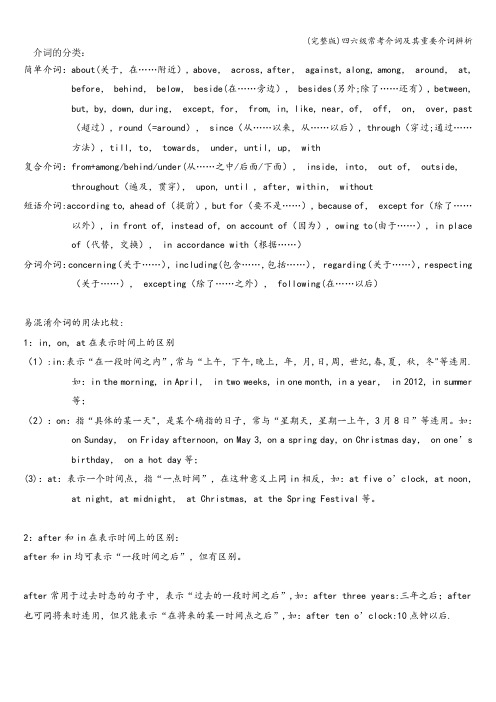
介词的分类:简单介词:about(关于,在……附近), above, across, after, against, along, among, around, at, before, behind, below, beside(在……旁边), besides(另外;除了……还有), between,but, by, down, during, except, for, from, in, like, near, of, off, on, over, past(超过), round(=around), since(从……以来,从……以后), through(穿过;通过……方法), till, to, towards, under, until, up, with复合介词:from+among/behind/under(从……之中/后面/下面), inside, into, out of, outside, throughout(遍及,贯穿), upon, until , after, within, without短语介词:according to, ahead of(提前), but for(要不是……), because of, except for(除了……以外), in front of, instead of, on account of(因为), owing to(由于……), in placeof(代替,交换), in accordance with(根据……)分词介词:concerning(关于……), including(包含……,包括……), regarding(关于……), respecting (关于……), excepting(除了……之外), following(在……以后)易混淆介词的用法比较:1:in,on, at在表示时间上的区别(1):in:表示“在一段时间之内”,常与“上午,下午,晚上,年,月,日,周,世纪,春,夏,秋,冬"等连用.如:in the morning, in April, in two weeks, in one month, in a year, in 2012, in summer等;(2):on:指“具体的某一天",是某个确指的日子,常与“星期天,星期一上午,3月8日”等连用。
小学常见介词用法辨析及习题

小学常见介词用法辨析一、介词的定义及分类介词是一种用来表示词与词、词与句之间的关系的虚词,,在句中不能单独作句子成分。
介词后面一般有名词、代词或相当于名词的其他词类,短语或从句作它的宾语。
按构成分为简单介词(in、on、at等)、合成介词(into、within等)、重叠介词(at about等)、短语介词(in front of等)。
二、小学常用介词用法释义(一)表时间1、常用词in、on、at。
In:①+年份/世纪。
in 2019(在2019年);In the1990s(在19世纪90年代).②+月份。
In May(在五月).③+季节。
In spring/summer/autumn/winter(在春/夏/秋/冬季).④+一天的某个时间段(上午、下午、晚上等)。
In the morning/afternoon/eveningat :①+时刻、几点。
at six(在6点)/~half past ten(在10点半)②+年龄。
at thirteen/~the age of thirteen(在13岁时)③+某个时段at noon(在中午),at night(在晚上), at midnight(在午夜),at dawn(在黎明)on :①+星期几。
on Wednesday/Sunday(在星期三/在星期日)②+日期。
On June 4th =on the fourth of June (在六月4日)③+有day的节日。
On Christmas Day/Teacher’s Day(在圣诞节/教师节)④+具体某一天。
On a cold day(在一个寒冷的一天)、on Sunday afternoon(在星期日下午)2、其他常用词Before:在...之前after:在...之后since:自从...开始for +一段时间until:直到...时候from...to:从...到... (二)表方位1、常用词in、on、at。
三年级英语介词at、in、on的用法练习题20题(答案解析)

三年级英语介词at、in、on的用法练习题20题(答案解析)1.We have English class at eight o'clock.A.atB.inC.on答案解析:A。
at 用于具体的时间点,eight o'clock 是具体的时间点,所以用at。
in 用于较大的时间范围,比如in the morning。
on 用于具体的某一天,比如on Monday。
2.She was born in May.A.atB.inC.on答案解析:B。
in 用于较大的时间范围,May 是一个月,属于较大的时间范围,所以用in。
at 用于具体的时间点,on 用于具体的某一天。
3.My birthday is on July 1st.A.atB.inC.on答案解析:C。
on 用于具体的某一天,July 1st 是具体的一天,所以用on。
at 用于具体的时间点,in 用于较大的时间范围。
4.The meeting is at 3 pm.A.atB.inC.on答案解析:A。
at 用于具体的时间点,3 pm 是具体的时间点,所以用at。
in 用于较大的时间范围,on 用于具体的某一天。
5.We go to school in the morning.A.atB.inC.on答案解析:B。
in 用于较大的时间范围,the morning 是较大的时间范围,所以用in。
at 用于具体的时间点,on 用于具体的某一天。
6.The party is on Sunday.A.atB.inC.on答案解析:C。
on 用于具体的某一天,Sunday 是具体的一天,所以用on。
at 用于具体的时间点,in 用于较大的时间范围。
7.I do my homework at night.A.atB.inC.on答案解析:A。
at 用于具体的时间点,night 在这里表示晚上这个时间点,所以用at。
in 用于较大的时间范围,on 用于具体的某一天。
小学六年级介词的常见用法归纳与解析

小学六年级介词的常见用法归纳与解析介词是英语中一种非常重要且常用的词类,它用来连接名词、代词、动词、形容词和副词等,起到表示位置、方向、时间、原因等等的作用。
在小学六年级的学习中,理解和正确运用介词是非常关键的。
本文将介绍小学六年级常见的介词用法以及对其进行分析和解析。
一、表示位置和方向的介词1. in介词"in"表示在某个范围、区域内,常用来指示地点或位置。
例如:in the classroom(在教室里)、in the park(在公园里)2. on介词"on"用来表示在某个表面或较大的平面上。
例如:on the table(在桌子上)、on the floor(在地板上)3. at介词"at"用来表示确切的位置或地点,通常用在某个建筑物或公共场所名称之后。
例如:at the bus stop(在公交车站)、at the library(在图书馆)4. into介词"into"表示进入某个地点或物体。
例如:jump into the water(跳进水中)、walk into the house(走进房子)5. out of介词"out of"表示从某个地方或物体出来。
例如:get out of the car(从车里出来)、take the book out of the bag (把书从包里拿出来)二、表示时间的介词1. at介词"at"用来指示具体的时间点。
例如:at 7 o'clock(在7点钟)、at noon(在中午)2. on介词"on"用来指示具体的日期或星期几。
例如:on Monday(在星期一)、on May 1st(在5月1日)3. in介词"in"用来指示一个时间段或某个月、季节、年代。
例如:in the morning(在早上)、in winter(在冬天)三、表示原因和目的的介词1. for介词"for"表示为了某个目的或原因。
全国通用版小学英语介词用法的语法讲解+介词使用场景专项巩固提升练习题附参考答案

小学英语介词的用法讲解+专项练习题+参考答案一、介词的用法:1、in(1)表示“在……里面”;in the lake在湖里(2)也可用在表示季节,早、中、晚等时间词前面。
in spring在春天 in the morning在早上in the afternoon在下午 in the evening在晚上2、on(1)表示“在……上面”;on the desk在桌子上(2)也用于星期前。
on Sunday在周日3、at(表示在小地方) 在.....at home在家 at school在学校4、to 向Happy birthday to you!祝你生日快乐!5、for 给Here is a present for you!这是给你的礼物。
6、under 在……下面The cat is under the tree.猫在树下。
7、behind在……后面The monkeyis behind the door猴子在门后。
二、介词专项练习题把下面的介词“in on under for to behind at”,填上合适的横线上。
1.The cat is_____ the tree.2. In summer, he swims_____ the lake.3. She goes to school____Mondays.4. Amy is_______home.5. Happy birthday_______you!6. It’s warm________spring7. The box is__________the door.8. Here is a present_______you!参考答案:1.under 2.in 3.on 4.at 5.to 6.in 7.behind 8.for。
(完整版)小学介词专项练习
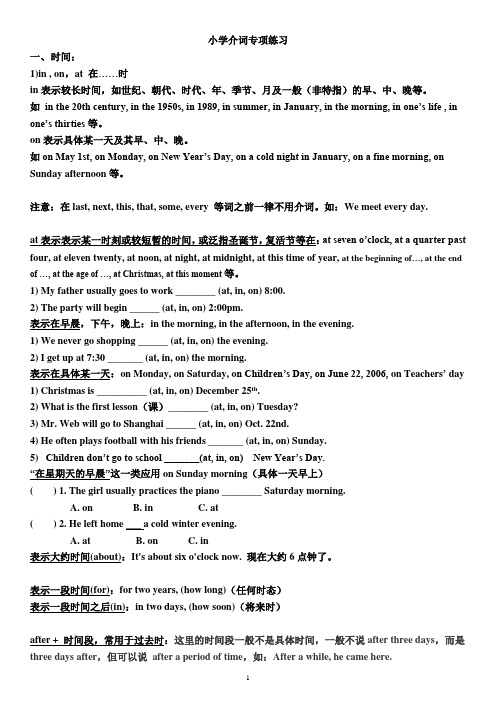
小学介词专项练习一、时间:1)in , on,at 在……时in表示较长时间,如世纪、朝代、时代、年、季节、月及一般(非特指)的早、中、晚等。
如in the 20th century, in the 1950s, in 1989, in summer, in January, in the morning, in one’s life , in one’s thirties等。
on表示具体某一天及其早、中、晚。
如on May 1st, on Monday, on New Year’s Day, on a cold night in January, on a fine morning, on Sunday afternoon等。
注意:在last, next, this, that, some, every 等词之前一律不用介词。
如:We meet every day.at表示表示某一时刻或较短暂的时间,或泛指圣诞节,复活节等在:at seven o’clock, at a quarter past four, at eleven twenty, at noon, at night, at midnight, at this time of year, at the beginning of…, at the end of …, at the age of …, at Christmas, at this moment等。
1) My father usually goes to work ________ (at, in, on) 8:00.2) The party will begin ______ (at, in, on) 2:00pm.表示在早晨,下午,晚上:in the morning, in the afternoon, in the evening.1) We never go shopping ______ (at, in, on) the evening.2) I get up at 7:30 _______ (at, in, on) the morning.表示在具体某一天:on Monday, on Saturday, o n Children’s Day, on June 22, 2006, on Teachers’ day1) Christmas is __________ (at, in, on) December 25th.2) What is the first lesson(课)________ (at, in, on) Tuesday?3) Mr. Web will go to Shanghai ______ (at, in, on) Oct. 22nd.4) He often plays football with his friends _______ (at, in, on) Sunday.5) Children don’t go to school _______(at, in, on) New Year’s Day.“在星期天的早晨”这一类应用on Sunday morning(具体一天早上)( ) 1. The girl usually practices the piano ________ Saturday morning.A. onB. inC. at( ) 2. He left home ___ a cold winter evening.A. atB. onC. in表示大约时间(about):It's about six o'clock now. 现在大约6点钟了。
人教版四年级英语介词用法练习题50题含答案解析

人教版四年级英语介词用法练习题50题含答案解析1.The party is ____ Sunday.A.inB.onC.at答案解析:B。
“on”用于具体的某一天,Sunday 是具体的一天,所以用“on”。
“in”用于较大的时间范围,如in May(在五月);“at”用于具体的时间点,如at six o'clock(在六点)。
2.We have a meeting ____ 3 pm.A.inB.onC.at答案解析:C。
“at”用于具体的时间点,3 pm 是具体的时间点,所以用“at”。
“in”和“on”不用于具体的时间点。
3.My birthday is ____ May.A.inB.onC.at答案解析:A。
“in”用于较大的时间范围,May(五月)是一个较大的时间范围,所以用“in”。
“on”用于具体的某一天;“at”用于具体的时间点。
4.The concert is ____ the evening.A.inB.onC.at答案解析:A。
“in the evening”是固定搭配,表示“在晚上”。
“on”不用于“the evening”;“at”用于具体的时间点。
5.She goes to school ____ Monday morning.A.inB.onC.at答案解析:B。
“on”用于具体的某一天的上午、下午或晚上,Monday morning 是具体的一天的上午,所以用“on”。
“in”用于较大的时间范围;“at”用于具体的时间点。
6.The train leaves ____ 8:30 in the morning.A.inB.onC.at答案解析:C。
“at”用于具体的时间点,8:30 in the morning 是具体的时间点,所以用“at”。
“in”和“on”不用于具体的时间点。
7.We have a picnic ____ summer.A.inB.onC.at答案解析:A。
(完整版)介词的用法及习题
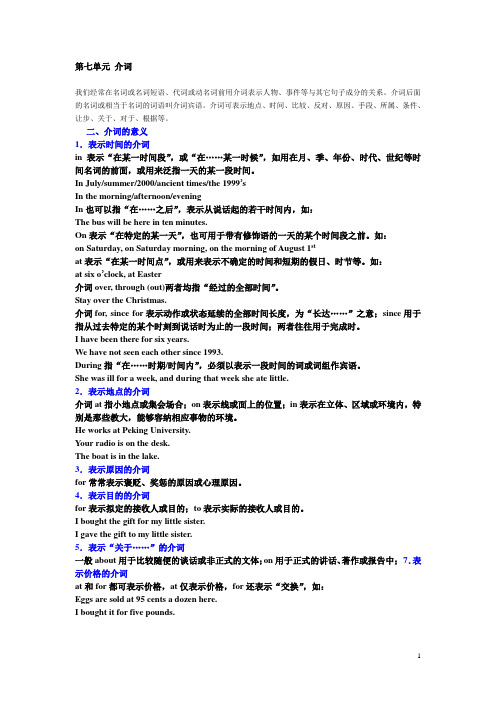
第七单元介词我们经常在名词或名词短语、代词或动名词前用介词表示人物、事件等与其它句子成分的关系。
介词后面的名词或相当于名词的词语叫介词宾语。
介词可表示地点、时间、比较、反对、原因、手段、所属、条件、让步、关于、对于、根据等。
二、介词的意义1.表示时间的介词in表示“在某一时间段”,或“在……某一时候”,如用在月、季、年份、时代、世纪等时间名词的前面,或用来泛指一天的某一段时间。
In July/summer/2000/ancient times/the 1999’sIn the morning/afternoon/eveningIn也可以指“在……之后”,表示从说话起的若干时间内,如:The bus will be here in ten minutes.On表示“在特定的某一天”,也可用于带有修饰语的一天的某个时间段之前。
如:on Saturday, on Saturday morning, on the morning of August 1stat表示“在某一时间点”,或用来表示不确定的时间和短期的假日、时节等。
如:at six o’clock, at Easter介词over, through (out)两者均指“经过的全部时间”。
Stay over the Christmas.介词for, since for表示动作或状态延续的全部时间长度,为“长达……”之意;since用于指从过去特定的某个时刻到说话时为止的一段时间;两者往往用于完成时。
I have been there for six years.We have not seen each other since 1993.During指“在……时期/时间内”,必须以表示一段时间的词或词组作宾语。
She was ill for a week, and during that week she ate little.2.表示地点的介词介词at指小地点或集会场合;on表示线或面上的位置;in表示在立体、区域或环境内,特别是那些教大,能够容纳相应事物的环境。
小学专项练习题介词的用法练习及

小学专项练习题介词的用法练习及小学专项练习题介词的用法练习介词在英语中是一个非常重要的语法部分,其在句中作为连接词,起到“桥梁”作用,使句子组成完整、语意明确。
熟练使用介词可以让句子更加清晰明了,表达更准确自然。
本文将为大家介绍一些小学生常用的介词,同时提供一些练习题,以便大家更好地理解和掌握这个知识点。
一、介词的定义和分类介词是一种虚词,它通常用来连接或修饰名词、代词、动词、形容词或副词等。
在句子中,介词通常位于名词或代词之前,用来表示它们与其他句子部分之间的关系。
介词可以分为时间介词、地点介词、方式介词、原因介词和目的介词等,下面是一些常用的介词:1. 时间介词: at、in、on、during、for、since、until、by、from、to2. 地点介词: at、in、on、beside、over、above、under、below、near、by、behind、in front of3. 方式介词: by、with、like、as4. 原因介词: because of、due to、thanks to5. 目的介词: for、to、in order to二、练习题1. I usually have breakfast _______ 7:00 in the morning.2. The cat is hiding _______ the chair.3. I went to New York _______ the summer of 2019.4. We traveled to Japan _______ plane.5. She is good _______ cooking.6. The children are playing _______ the park.7. I have to finish this report _______ 5 p.m.8. Tom is waiting _______ his friends outside the cinema.9. My grandfather was born _______ 1925.10. We went camping _______ the weekend.三、答案及解析1. at2. under3. in4. by5. at6. in7. by8. for9. in10. for本文中提供了一些常见的介词并给出了基本的分类和定义,同时提供了一些简单的练习题以供练习。
人教版五年级英语介词by、from、of的用法练习题50题含答案解析

人教版五年级英语介词by、from、of的用法练习题50题含答案解析1. I go to school ____ bus every day.A. byB. fromC. of答案:A。
解析:“by + 交通工具”表示出行方式,“by bus”是乘坐公共汽车的意思。
选项B“from”表示来自,在这里不符合句子语境。
选项C“of”表示所属关系,也不能用于表示出行方式。
2. My father comes home ____ bike.A. byB. fromC. of答案:A。
解析:“by bike”是骑自行车的固定表达方式,表示出行的方式。
“from”表示来源,与句子要表达的爸爸回家的方式不符。
“of”表示所属关系,在此处不合适。
3. She goes to the park ____ foot.A. byB. fromC. of答案:A。
解析:“by foot”虽然在口语中更常用“on foot”,但在这里强调的是一种出行方式的考查,“by”后面接表示交通方式的名词。
“from”表示从哪里来,“of”表示所属关系,都不符合题意。
4. We will go to the zoo ____ car tomorrow.A. byB. fromC. of答案:A。
解析:“by car”是乘坐汽车的意思,是表示出行方式的常用表达。
“from”表示起点,“of”表示所属关系,这两个选项都不能用来表示去动物园的交通方式。
5. Tom gets to the library ____ subway.A. byB. fromC. of答案:A。
解析:“by subway”是乘坐地铁的意思,是正确的表示出行方式的用法。
“from”通常表示来源地,“of”表示所属关系,这两个选项都与乘坐地铁去图书馆的语境不匹配。
6. My mother goes to work ____ train.A. byB. fromC. of答案:A。
- 1、下载文档前请自行甄别文档内容的完整性,平台不提供额外的编辑、内容补充、找答案等附加服务。
- 2、"仅部分预览"的文档,不可在线预览部分如存在完整性等问题,可反馈申请退款(可完整预览的文档不适用该条件!)。
- 3、如文档侵犯您的权益,请联系客服反馈,我们会尽快为您处理(人工客服工作时间:9:00-18:30)。
小学常见介词用法辨析一、介词的定义及分类介词是一种用来表示词与词、词与句之间的关系的虚词,,在句中不能单独作句子成分。
介词后面一般有名词、代词或相当于名词的其他词类,短语或从句作它的宾语。
按构成分为简单介词(in、on、at等)、合成介词(into、within等)、重叠介词(at about等)、短语介词(in front of等)。
二、小学常用介词用法释义(一)表时间1、常用词in、on、at。
In:①+年份/世纪。
in 2019(在2019年);In the1990s(在19世纪90年代).①+月份。
In May(在五月).①+季节。
In spring/summer/autumn/winter(在春/夏/秋/冬季).①+一天的某个时间段(上午、下午、晚上等)。
In the morning/afternoon/eveningat :①+时刻、几点。
at six(在6点)/~half past ten(在10点半)①+年龄。
at thirteen/~the age of thirteen(在13岁时)①+某个时段at noon(在中午),at night(在晚上), at midnight(在午夜),at dawn(在黎明)on :①+星期几。
on Wednesday/Sunday(在星期三/在星期日)①+日期。
On June 4th =on the fourth of June (在六月4日)①+有day的节日。
On Christmas Day/Teacher’s Day(在圣诞节/教师节)①+具体某一天。
On a cold day(在一个寒冷的一天)、on Sunday afternoon(在星期日下午)2、其他常用词Before:在...之前after:在...之后since:自从...开始for +一段时间until:直到...时候from...to:从...到...(二)表方位1、常用词in、on、at。
In:①在...里面:In the classroom(在教室里)①+大地点:In China(在中国);in Nanjing(在南京)On:①在上面(表面):On the desk(在桌子上)①在左右边:On your right(在你右边)At:①+小地点(大、小是相对而言):at home(在家);at the party(在宴会上)。
①向,朝向:laugh at/shout at/point at2、其他常见方位词(三)其他常见介词三、常用介词的固定搭配For: be bad for/cheer for(为...欢呼)/make a cake for him/have a cake for breakfast/be ready for/ask...for help/look out for/look for/be late for On: get on(上车)/on Moon Street/on the tree(树上结的、标志)/on the way/put on(穿上、上演)/try on/come on(加油)/on foot/go on/from then on/on one’s birthday(在某人生日的时候)In: get in(进去)/in Sunshine Town/in+颜色/do well in/in the tree(外来的东西在树上)/ put...in orderUp: get up(起床)/stand up/pick up/wake up(叫醒)/dress up(化妆打扮)/grow up(成长)/hurry up(赶快)To:pay attention to(注意)/next to(在...旁边,紧挨着)/get to(到达)/the way to(去...的路)/To protect the Earth(为了保护地球)/want to/would like to(想要)/be going to(将要)/listen to(听)At: at the traffic lights(在红绿灯)/at home/be good at/look at(看)/at this festival(在这个节日)/arrive at(到达)From: from...to.../far away from(远离)/get out from(从...出来)Around:look around(环顾四周)/around the world(全世界)/show...around(带...参观)Behind: leave ...behind(留下,丢下)By: sit by(坐在...旁边)/by the river(在河边)/by bus/metro/taxi/bike/plane/ship/train(乘坐...)About: talk about(谈论关于)/what about、how about(...怎么样)/care about(关心)Of:take care of(关心,在乎)/be full of(充满)/a glass of(一杯)/be afraid of(害怕)/a lot of /lots of(许多)四、习题练兵场(一)选词填空1.I usually get up (in/at) 6 o’clock (on/in) the morning.2.My father is (at/in) Shanghai now.3.The TV was black and white (in/on) the 1980s.4.Lily is going to visit his grandparents (in/on) National Day.5.We plant a lot of trees (at/on) May 1st.6.Our class will go on an outing (at/in) Spring.7.There are so many apples (in/on) the tree.8.There is a sign “No littering” (in/on) the tree.9.I was (in/at) home (at/on) half past eight yesterday.10.The book is (at/on) your right.11.The lion was caught (with/by) the net.12.The Longtan park is (in front of/in the front of) my house.13.The blackboard is (in/on) the wall.14.All of the girls are (in/on) red (at/in) the party.15.David find a big hole (at/on) the ground.(二)单选题1.There is a small house the middle the mountain.A.in,ofB. on,inC. at,ofD. from,of2.The tiger could not get out the net.A.inB.withC.fromD.off3.Sam often goes school the school bus.A.to,atB.on,fromC.from, onD.to,on4.He cut the net a sharp knife.A. In, withB. in,byC.out, byD.out,with5.Jack usually goes to school bus.A.byB.onC.inD.at6. My patents works Nanjing.A.inB.atC.onD.from7. protect the air, he always goes to work foot.A. to,inB.for, onC.to,onD.for,on8.Bobby likes going fishing the river warm day.A.at,onB.at,inC.in, onD.in, in9.The school gate opens noon.A.inB.onC.atD.for10.There is a building the river.A.byB.atC.inD.on11.There are lots of people the bus station.A.onB.inC.atD.from12.Please put your books and pencils order.A.onB.inC.atD.for13.Many students play games the tree.A.onB.inC.upD.under14.I live school. I come to school metro.A.in,byB.by,byC.near,onD.near,by15.My best friend Lily lives her grandparents Moon Street.A.in,atB.in,onC.with, atD.with,on16.The factory is far away the city.A.inB.onC.fromD.at17.I like reading stories the Monkey King.A.onB.atC.aboutD.for18.I usually have an egg breakfast.A.fromB.toC.onD.for19.There is a party the prince’s house.A.atB. inC.onD.for20.Su Hai’s birthday is the second May.A.at,ofB.at,inC.on,ofD.on,in。
